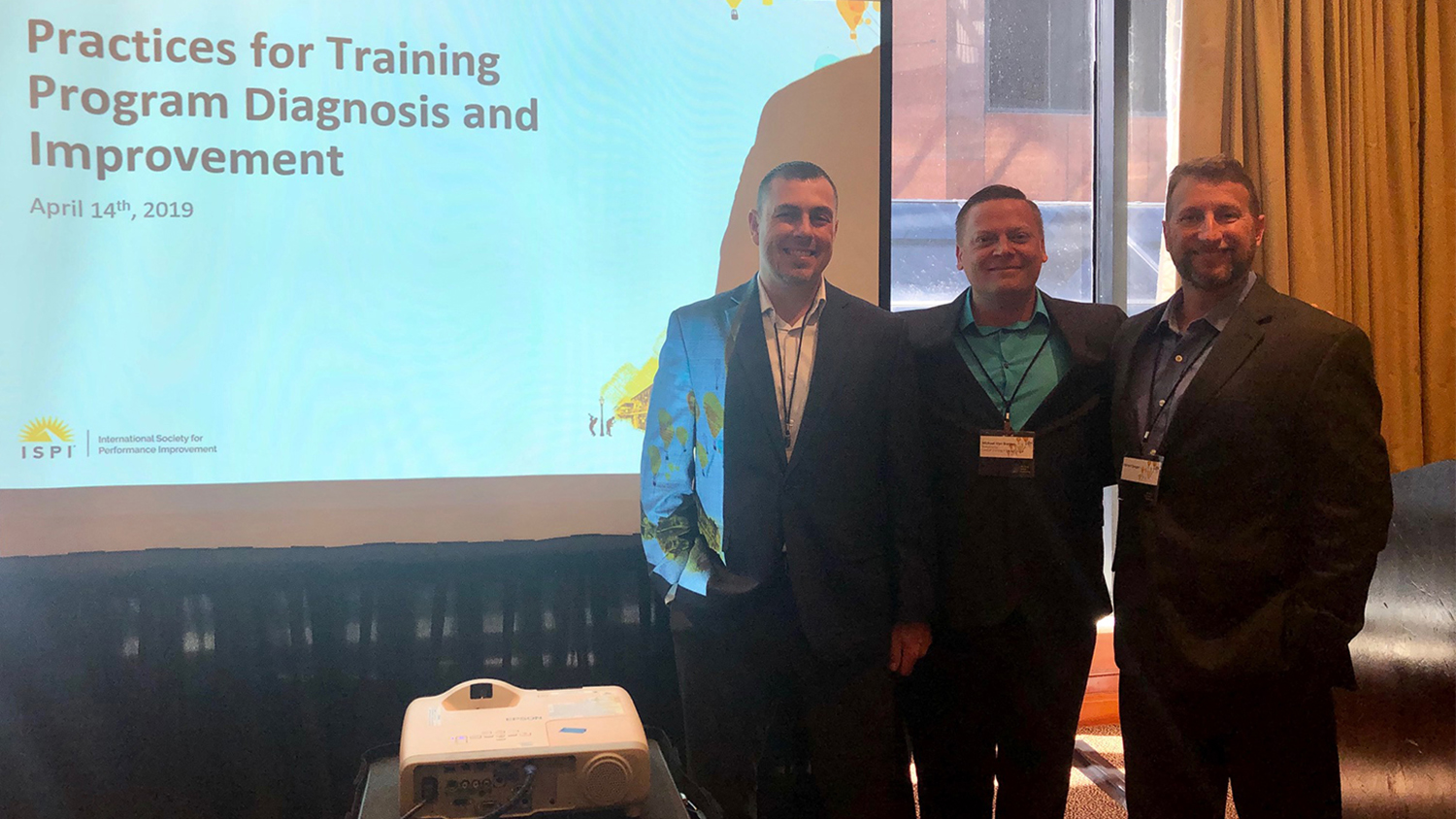Three Colleagues Tackle Master’s Degree and Professional World

Three years of study and three dedicated students have transformed workplace training in ways no one could have anticipated — not even them.
Jason Cook, Richard Singer and Michael Von Bargen met as nuclear station instructors at Duke Energy’s Harris Nuclear Plant, but they don’t just work together. They’re classmates who have recently completed NC State’s online Master of Education in Training and Development. They joined the program together, hoping to advance in their field and make tangible improvements to the training programs they led at work. Looking back, they realize how far they surpassed their original goals.
“Within the first semester, we were completely amazed at the door that we opened. We thought that we were knowledgeable and skilled prior to starting the program. In fact, we thought the entire course would be just a refresh for what we already thought we knew. Each semester we were able to learn more about our profession and craft and apply it in our jobs,” says Performance Improvement Specialist Michael Von Bargen.
The group’s experience in the program consisted of valuable intersections between their coursework and real-life challenges at work. In fact, lessons matched perfectly with aspects of their jobs that needed attention. This motivated them to implement what they learned, reinforced their efforts with research and garnered meaningful results.
“We found multiple opportunities to implement the teachings from the program into our current careers, resulting not only in efficiency gains but performance improvement on a measurable scale for our company.”
In similar fashion, they incorporated industry knowledge into their courses, providing suggestions that would better the course to Teaching Assistant Professor Michelle Bartlett, who listened to their feedback and took it into consideration for the future.
“Working with Michelle during this course achievement felt like a collaborative team,” says Von Bargen.
“We would often discuss the challenges we were facing in our workplace with Michelle and how the courses may not emulate these. We saw improvements in courses that were being made and felt we added value to the Training and Development program while gaining our own value in the content it was designed to deliver.”
Bartlett also made sure the students felt heard when they encountered the challenges of going back to school, like finding work-life balance and getting back into an academic mindset. Instructional Designer and Instructor Richard Singer appreciates that the program was accessible outside of a traditional classroom setting.
“Completing my master’s degree while working full time made it challenging to balance life, work and school, but having this program entirely online made it possible.”
The team’s hard work paid off; they presented at the International Society for Performance Improvement (ISPI) Annual Conference in New Orleans in April 2019.
At the conference, they shared the training diagnostic tool they developed as part of an independent study course. Singer said the tool can be used to efficiently and effectively improve workplace and higher education courses or programs by prioritizing any improvement and corrective actions to be taken. They also shared the master’s program’s profound impact on organizational efficiency at Duke Energy.
According to Von Bargen, “Our [training] program, which originally lasted 18 months and only had a 68% success rate, was transformed into a 14-month program with a 92% success rate. With the reduction in program length, along with the increase in success rate, over $1.5 million in savings was generated in only two classes.”
It’s safe to say their presentation was a hit. Bartlett noted there was standing room only with people sitting in the aisles to listen to the group.
“The presentation was very well received and resulted in many offers for us to consult with military, airline, and health care training departments in the future. We are considering writing a book to fully explore our training diagnostic tool and implementation strategies to maximize the return on investment for modern learning environments,” says Singer.
Back home in North Carolina, they’re putting education to action. As they continuously apply what they learned in the form of program advancements, quality deliverables and best practices, they’ve set their sights on industry-wide change. They’ve recommended the Training and Development program to their colleagues, a move that will hopefully prompt broad improvement.
Senior Nuclear Operations Training Instructor Jason Cook suggests completing the program with a trusted group of peers and building relationships with instructors. “It was much easier completing the program with a few others to shoot ideas across and to share projects with. We appreciate all of Michelle Bartlett’s help.” In addition, the group believes that taking advantage of course materials early on, like group forums and the syllabus, will only better the educational experience.
As they graduate, Cook, Singer and Von Bargen have a lot to be proud of. They’ve embodied what it means to Think and Do.
For Singer, “This journey has made a positive impact both on my perspective of education and instructional skills to make a difference in the world of training.”
“The culmination of all this work resulted in a training program that was notorious for failure becoming one of the industry’s leading training programs,” Von Bargen adds. “This is true adult learning! This really felt like more of an accomplishment than just earning an M.Ed. It felt like we made an impact, not only in our own workforce, but in NC State’s Training and Development program.”
Are you interested in NC State’s online master’s degree or graduate certificate in Training and Development? Visit go.ncsu.edu/tdonline for more information.


